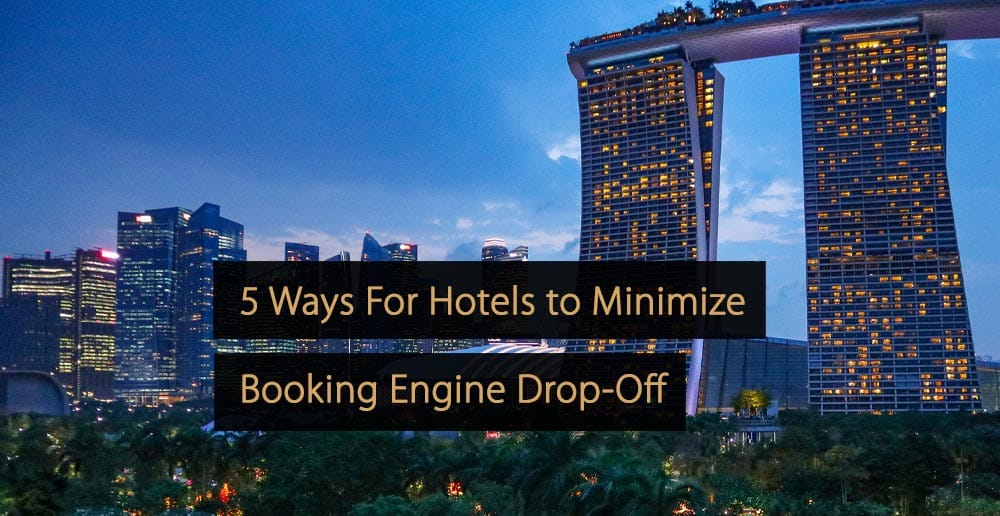Your hotel’s website might be buzzing with traffic due to all the hard work and resources you’re putting into attracting visitors. But is your website as efficient as you wish it was? Imagine a potential guest, excited and ready to book, but something doesn’t click, and they leave without completing the reservation. That’s booking engine abandonment– a frustrating scenario where your rooms remain unsold, and your investment in traffic generation doesn’t quite hit the mark.
Understanding Booking Engine Abandonment
In this blog, you will discover the mysteries behind this phenomenon. You find the common reasons why users abandon their bookings and, most importantly, strategize on mitigating this issue. It’s about understanding the ‘why’ and mastering the ‘how’ to transform those almost-bookings into successful reservations. Buckle up and find out how to turn potential losses into profitable conversions.
Booking engine abandonment is a critical issue that’s all too common in the hospitality industry yet often overlooked. It can be a significant barrier to converting interested visitors into actual guests. In the travel industry, an astonishing 81.7% of potential bookings don’t reach completion. That’s over four in every five interested visitors leaving your website without securing a reservation. It’s a scenario that paints a vivid picture of lost opportunities and revenue.
But why exactly do so many potential guests get cold feet at the last minute? The reasons are as varied as the customers themselves. Most are not ready yet to pull the trigger on their booking, for others, price becomes the stumbling block, prompting them to either baulk at the cost or shop around for a better deal. Others feel the need to pause and consult with their peers. And lastly, some can have technical difficulties or be unhappy with your suitable payment methods.
The bottom line is, that understanding the multifaceted nature of booking engine abandonment is critical. It’s not just about individual sales slipping through the net; it’s about the broader implications for your hotel’s ROI, encompassing marketing strategies and website design investments. Addressing this issue is essential in transforming browsers into bookers, ensuring a smooth journey from initial interest to confirmed reservation.
5 Reasons Why Potential Guests Abandon Your Booking Engine & How to Fix It
The article will now go through five crucial reasons why potential guests would abandon the booking engine and how to fix it.
1. Decision Time: The Hesitant Booker
Indecision is a key factor leading to booking abandonment. Potential guests often hesitate to commit immediately, either weighing options or grappling with uncertainties about accommodation costs. Effective communication of your hotel’s value proposition is crucial to reassure them and demonstrate your value. If guests perceive the cost as exceeding the value, booking abandonment is more likely. Engaging these bookers proactively is essential. Providing compelling reasons to book directly, such as exclusive offers and personalized messages in the booking engine, along with highlighting your hotel’s unique selling points (USPs), can encourage them to finalize their booking. On top of that, implementing features like Saved Search messaging can also be beneficial. By allowing guests to have their search details emailed, they can easily resume the booking process at a later stage, reducing the likelihood of abandonment.
Addressing another major concern, the fear of inflexible cancellation policies or costly booking changes, is vital. Building trust through clear articulation of your cancellation and refund policies on your website can eliminate uncertainty and instill confidence in potential guests. Moreover, incorporating a live chat or chatbot feature offers immediate assistance for any inquiries, facilitating a smoother booking process.
Ultimately, by addressing the concerns of hesitant bookers and providing clear, compelling reasons to complete their booking, you can significantly reduce booking engine abandonment rates.
2. Technical Issues: The Digital Roadblocks
Technical hiccups like slow loading times and random website crashes are real deal-breakers when booking a hotel. Imagine a guest, all set to book, only to be stalled by a sluggish website – it’s a quick way to lose their interest. And here’s an interesting bit: the frustration is even higher on mobile, with an abandonment rate of 85.6% compared to 73.1% on desktop. This becomes a crucial point in today’s world, where everyone’s practically living on their phones.
The solution? Step up your website’s performance. Opt for robust web hosting, speed things up with optimized images, and watch for performance glitches. Making your website mobile-friendly is also key. It’s not just about looking good on a smaller screen; it’s about offering a seamless experience that builds trust and keeps those mobile users engaged. Think of fast loading and no filler content. A smooth, fast, and reliable website experience can significantly reduce the chances of your guests bouncing off and increase the likelihood of completing their bookings.
3. User Experience: Navigating the Maze
Right on the heels of technical issues, another critical factor leading to booking abandonment is user experience. When navigation is complex, or the booking process is laden with too many steps, it can overwhelm and confuse guests. If finding what they need feels like solving a puzzle or booking seems like a marathon, guests are likely to throw in the towel.
Improving user experience is the lifeline here. Streamline the booking process to a few straightforward steps and ensure that navigation leads intuitively towards the booking engine. The ‘Book Now’ buttons should be unmissable beacons, guiding users clearly and compellingly towards finalizing their reservations. A good start for this is having a strong website template designed specifically for the hotel industry. These templates are built with your guests and their journey in mind, making it much easier for you to maintain a conversion-focused user experience.
Again, don’t underestimate the power of mobile responsiveness. In today’s mobile-centric world, a site or app that falters on smaller screens can drive away a significant portion of your audience. A mobile-responsive, easy-to-navigate, visually appealing, and secure design is essential. You can incorporate inline messaging on desktop and mobile for a seamless experience. These messages can keep the user engaged and informed, guiding them smoothly through the booking process. Remember, the goal is to make booking a room as easy and pleasant as picking out a favorite holiday destination.
By ensuring that every step in the user journey is clear and leads towards the booking engine, you eliminate confusion and make the path to booking as inviting as the stay at your hotel itself.
4. Pricing Transparency: Hidden Surprises
One of the quickest ways to lose a potential guest’s trust is by springing unexpected costs on them at the last minute. When finalizing a booking, encountering hidden fees like taxes or service charges can feel like a betrayal, leading to immediate abandonment.
The key to preventing this is transparent pricing. Make a habit of displaying all costs upfront. This transparency builds trust and prevents those last-minute surprises that can sour the booking experience. Additionally, incorporating price comparison tools or offering best price guarantees can further reassure guests. It shows that you’re open about your pricing and confident that you’re offering the best value. This approach turns the pricing stage from a potential obstacle into an opportunity to cement trust and commitment.
5. Payment Options: Flexibility is Key
In the final stretch of the booking journey, the payment process can seal or break the deal. Limited payment methods and security concerns can be major turn-offs for guests. Imagine this: a guest has navigated your site, found the perfect room, and is ready to book, but then they can’t use their preferred payment method. Frustration sets in, and you’ve lost a booking just like that.
Offering various secure payment options is crucial to ensure this doesn’t happen. While credit and debit cards are common but not everyone’s cup of tea. Expanding your payment arsenal to include digital wallets like PayPal, Amazon Wallet, and Apple Pay can make a world of difference. These options cater to a broader audience and often provide an added layer of security and convenience that today’s guests appreciate.
It’s also essential to ensure your payment gateway is secure and certified. This openness about fees and security not only provides peace of mind to your guests but also adds a layer of credibility to your booking process. By accommodating various payment preferences and prioritizing security, you make it easy and reassuring for guests to go from browsing to booking.
Tackling booking engine abandonment is a multifaceted challenge that requires a thoughtful and comprehensive approach. Each aspect is crucial, from addressing technical issues like slow loading times to refining the user experience with intuitive navigation and clear booking paths. Ensuring transparent pricing and diverse, secure payment options are equally important in building trust and convenience for potential guests. By implementing these strategies, hotels can transform potential losses into profitable conversions, turning hesitant browsers into satisfied bookers. The key is understanding the nuances of guest behavior and preferences, using this insight to create a seamless, reassuring, and efficient booking experience.
More Tips to Grow Your Business
Revfine.com is the leading knowledge platform for the hospitality and travel industry. Professionals use our insights, strategies, and actionable tips to get inspired, optimize revenue, innovate processes, and improve customer experience.Explore expert advice on management, marketing, revenue management, operations, software, and technology in our dedicated Hotel, Hospitality, and Travel & Tourism categories.








Leave A Comment